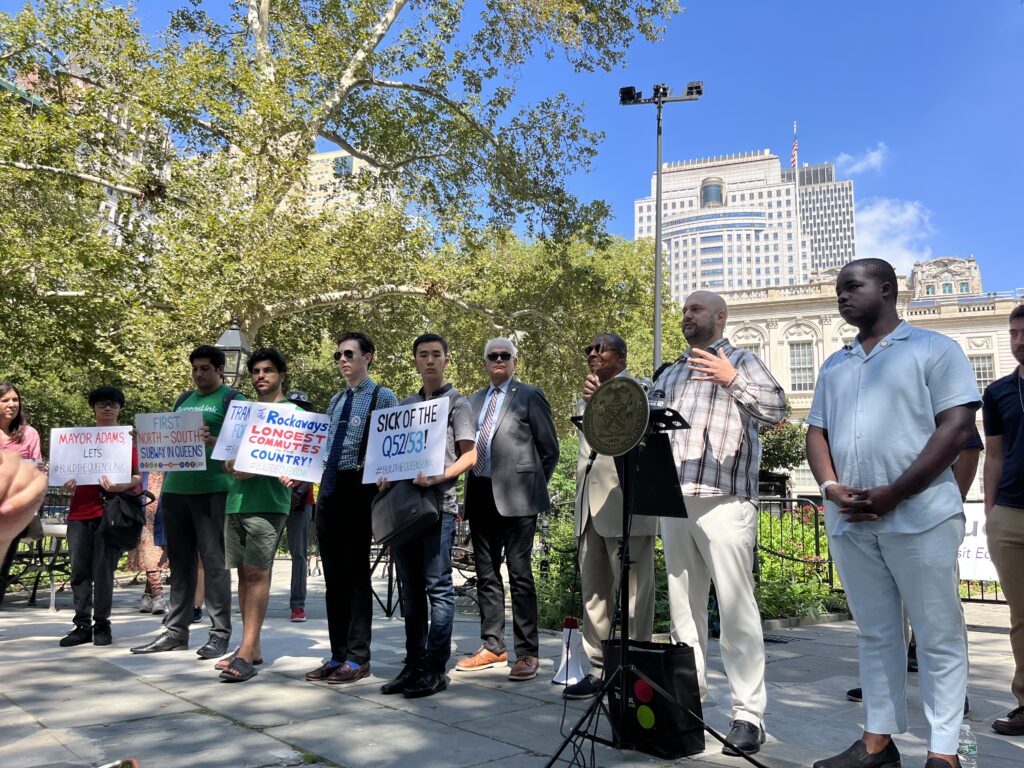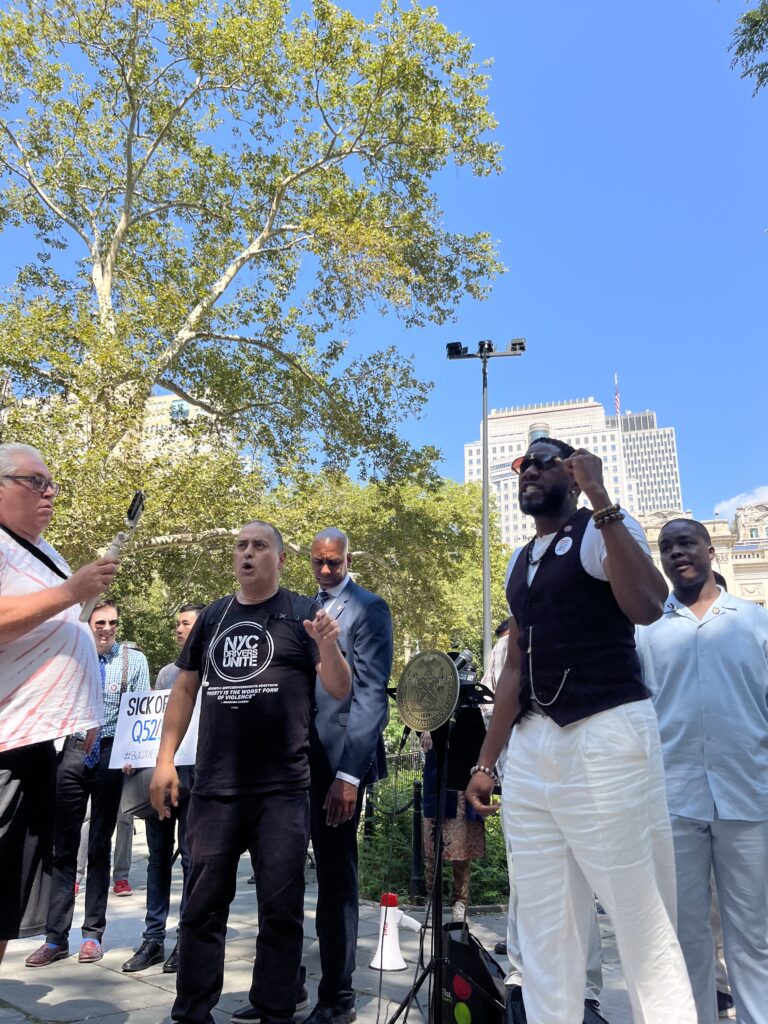By Oona Milliken | omilliken@queensledger.com
After years of fighting, transportation advocates in Queens might finally see a payoff. Supporters of the QueensLink, a proposal to expand transit lines in Central and Southeastern Queens, gathered Wednesday, Sep. 6 to rally for the implementation of the project in the borough. Rick Horan, transportation activist and executive director for QueensLink, said he started advocating for the reactivation of the Rockaway Beach Branch in May of 2015 after years of frustrating commutes from his home in the Rockaways to his work in Manhattan. Instead, he said he found that opposition was the typical “Not in My Backyard,” attitude also referred to as NIMBY.
“I became aware of the Rockaway Beach Branch right-of-way, and was very curious as to why it was not used for transit and just sitting there,” Horan said. “I looked into it and found that it seemed to be just a typical NIMBY opposition that was standing in the way of a bit being reactivated.”
The project faltered last year when Mayor Eric Adams put $35 million towards MetHub, the first phase of a project more broadly known as QueensWay, which intends to convert the old railroad into a Highline-esque park. After Mayor Adams’s decision became public, several politicians, such as Queens Borough President Donovan Richards as well as State Senator James Sanders and Assemblymember Khaleel Anderson came out in support of QueensLink in the fall of last year.
Now, QueensLink supporters are trying to revive the movement and chanted at Mayor Adams in front of City Hall to get his attention. The project seeks to add four new stops along the M train on top of an abandoned MTA Rockaway Beach Branch rail with parks along parts of the rail route with connections to the A, J/Z, E,F, R and 7 trains, as well as the LIRR. According to the QueenLink website, the expansion will provide access to an additional 47,000 daily riders and is expected to cost around $3.5 billion.
Transportation in the area is much needed, according to Michael Carlier, Parks and Transportation Liaison for Borough President Richard’s Office.
“Southeast Queens residents are saddled with limited access to subways and a reliance on often spotty bus service,” Carlier said. “We can definitely do better. And we should. This shortcoming disproportionately impacts many of our boroughs, low-income communities, where residents depend on mass transit to get to work exclusively.”
State Assemblymember James Sanders, a Rockaway resident and representative for the 10th District, said his drive into the city is often hindered by traffic congestion, and that QueensLink would provide a better alternative.
“I drove here from the Rockaways this morning, and I started at 7:15 a.m. I was gonna be at a nine o’clock meeting. I got here at 9:40 a.m. That is not good.” Sanders said. “Not only did I pollute the Earth, not only was I late, but we could have done so much better. I would have rather taken the train. I would have rather taken the Queen’s link.”
Supporters of QueensWay argue that Queens residents have a lack of access to parks and that the new park would remedy that with further greenspace for Queens residents to bike in, walk through and enjoy time outdoors. Local elected officials and businesses in support of the QueensWay include Congresswoman Grace Meng, Senator Toby Ann Stavisky, the Queens Tourism Council, as well as the Queens Chamber of Commerce. Karen Imas, a Steering Committee member of Friends of QueensWay, declined to be interviewed for the story but sent a statement via email.
“Friends of the QueensWay is very excited about the progress on the QueensWay project and looks forward to working with the City of NY to realize the extraordinary near-term opportunity to activate quality open space, as well as environmental, economic and educational benefits for Central Queens, starting with the first phase called the MetHub,” Imas wrote in an email.
Currently, the MTA is currently conducting a 20-year study to determine potential metro investments, which includes the revitalization of the Rockaway Beach Branch. If approved, the three and a half mile section in Queens would be included in their Capital Program, which begins in 2025. Horan said he does not understand the sudden push for QueensWay, as there is plenty of green space in Queens that is not properly maintained. According to Horan, the QueensLink project would provide both new transportation and new parkland.
“There’s so much parkland in New York thats already in the system that’s not being cared for properly. Why this little skinny track land? Why fast-track that now?” Horan said. “At the same time that the right-of-way is being studied by the MTA in this 20-year needs assessment? I mean, you can’t make this stuff up.”
During NYC Public Advocate Jumaane Williams’ speech, the rally was interrupted by two hecklers who claimed to be representing rideshare and taxi drivers in opposition to the proposed congestion tax in New York City. The pair halted the rally with shouts, aimed both at Williams who is in support of congestion pricing, and the general assembly, but did not hold vitriol against the QueensLink program in particular.
“No congestion pricing, the link is fine, the QueensLink is fine, but no congestion pricing,” one of the men shouted.
The rally attracted supporters from across the political spectrum, including New York City Councilmember Bob Holden, who said he did not always see eye to eye with all the representatives at the rally but could agree on this project. Holden said the QueensLink was an obvious choice in modernizing existing railways while connecting Southeastern Queens to the rest of the borough.
“We have an opportunity to bring public transit, and not buses that are stuck in that traffic, a bus route that really is very, very slow, we have a chance to bring modern rail to our district to serve the people of Queens,” Holden said. “This is a win-win, like Jumaane said. This is where we agree, Jumaane Williams and I disagree on a lot of things, but we certainly agree on the QueensLink.”
Horan said he wants to continue to see commuters and Queens residents fight for expanded transit access in their borough and that the QueensLink has the potential to be an environmental and economic access to the region.

Pols, activists and supporters of QueensLink gathered at City Hall. Speaking: Mike Scala, counsel and legal advisor for QueensLink.
“People should be very upset with the administration who has made a unilateral decision about this very valuable right-of-way that holds so much potential value to Queens and the city as a whole,” Horan said.



